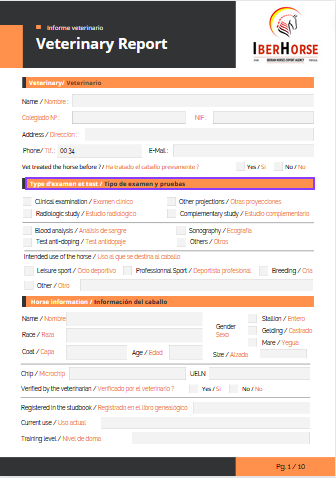This website uses cookies to give you the best possible user experience. Cookie information is stored in your browser and performs functions such as recognizing you when you return to our website or helping our team understand which parts of the website you find most interesting and useful.
IS THE HORSE IN GOOD HEALTH?
HERE IS AN IMPORTANT TIP
Do not buy a horse without first checking with a veterinarian that the horse is in good health.
The pre-purchase examination is not mandatory, but it will be your best investment.

Step 4 - We check that it is healthy
Step 4
We check that it is healthy
When we go to see the horses, we examine them physically to check that they have nothing that could affect their abilities.
But we are not veterinarians….. I therefore strongly recommend that you, before buying a horse, have a health check with a professional to avoid surprises.
If you wish, I will personally take care of sending a collaborating veterinarian.
I have been in the market for many years carrying out pre-purchase reviews throughout the peninsula, so I have worked with many of them and today I only collaborate with the best in each region.
They already know the protocol they have to follow and they do it perfectly.
The cost of the pre-purchase examination is always borne by the buyer.
The veterinarian who will examine your horse will be sent by me, but you pay for his service, so he's on your side, not the seller's.
He will tell you about everything he sees, no matter how insignificant, and record the movement tests on video movement he makes.
You will read everything in one bilingual report (Spanish/French or Spanish/English) for better understanding.
In the report, you will find his contact details in case your trusted veterinarian has questions and wishes to contact him directly.
If you decide to do X-rays, we will email them to you along with the report and videos.
The veterinary visit takes place in several stages
(Click on each point to find out more)
1. CHECK OF THE HORSE'S PAPERS
The veterinarian verifies that the description of the booklet corresponds, the microchip, the vaccinations.
2. CLINICAL EXAMINATION
The veterinarian will first examine the stationary horse (conformation, general condition, absence of wounds or externally visible lesions, legs conformation, etc.). Then, he carries out a complete clinical examination: cardiac and pulmonary auscultation, state of the mucous membranes, examination of the eyes, mouth, etc.
3. STATIC ORTHOPEDIC EXAMINATION (WHILE STOPPED)
Consists of a series of tests: hoof pinch test (detection of tenderness), joint flexion tests, joint extension tests, patella mobility test, checking the flexibility of the spine, absence of heat in the vertebrae...
4. DYNAMIC ORTHOPEDIC EXAMINATION (HORSE IN MOTION)
The veterinarian watches him trot in a straight line on a hard floor (back and forth), then he does the bends again, but keeping each joint flexed for 1 minute. The horse starts trotting immediately. If the appearance is the same before and after flexion, the test is negative, otherwise it is positive and reveals a problem concerning the joint tested or neighboring structures. Then, he looks at the horse in a circle, at both hands and three legs, to detect possible abnormalities in the kneecaps, muscles and tendons.
5. X-RAYS
Depending on the result of the examination and the use you are going to give it to your horse (leisure, sport, etc.), the veterinarian may recommend that you take x-rays of; feet, giblets, hocks, stifles, cervicals, back...
These X-rays are meant to rule out possible future injury issues due to osteoarthritis, osteochondrosis OCD, navicular disease…
6. OTHER COMPLEMENTARY EXAMINATIONS
- Orthopedic ultrasound: tendons and ligaments.
- Transrectal ultrasound: examination of the female genitalia and pelvis
- Endoscopy of the upper respiratory tract: confirms or rules out the presence of cornage
- Blood analysis: search for anemia, signs of inflammation, abnormal functioning of certain organs (kidneys, liver, etc.)
- Blood analysis: doping/drug residue screening.
- Coggins test (screening for Equine Infectious Anemia.
- Coprology: allows to know the level of parasitic infestation of the horse (intestinal worms).
- Piro-Like serology: screening for piroplasmosis, Lyme disease, erlichiosis and leptospirosis.

-
Clinical examination without x-rays 220 €
Steps 1 to 4 of the protocol.
-
Clinical examination with 14 x-rays 630 €
Steps 1 to 5 of the protocol.
-
Extra x-ray 30 €
From 20 x-rays, the price is €25 per image.
-
General control 135 €
Blood test. Results 3-6 days.
-
Piro test 150 €
Blood test. Results 3-6 days.
-
Infectious anemia 110 €
Blood test. Results 3-6 days.
-
Doping test 250 €
Analyse. Results 15-21 days.
A surcharge for the veterinarian's travel may be applied in certain cases where the stable is too far from the partner veterinarian's field of action.
Some horses/foals will be likely to be anesthetized to be able to do the X-rays, which will also include a supplement in the price of the examination.
If a supplement needs to be added to the price, I will let you know before contracting the service.
You want to do a veterinary check, but you have not found the horse with us?
Good news!
You can have the best veterinarian at your service, a bilingual report and me to manage it, for only 30 € extra.
